Book contents
- Frontmatter
- Contents
- Preface
- Acknowledgements
- I Relevant logic and its semantics
- 1 What is relevant logic and why do we need it?
- 2 Possible worlds and beyond
- 3 Situating implication
- 4 Ontological interlude
- 5 Negation
- 6 Modality, entailment and quantification
- II Conditionals
- III Inference and its applications
- Appendix A The logic R
- Appendix B Routley–Meyer semantics for R
- Glossary
- References
- Index
4 - Ontological interlude
Published online by Cambridge University Press: 03 September 2009
- Frontmatter
- Contents
- Preface
- Acknowledgements
- I Relevant logic and its semantics
- 1 What is relevant logic and why do we need it?
- 2 Possible worlds and beyond
- 3 Situating implication
- 4 Ontological interlude
- 5 Negation
- 6 Modality, entailment and quantification
- II Conditionals
- III Inference and its applications
- Appendix A The logic R
- Appendix B Routley–Meyer semantics for R
- Glossary
- References
- Index
Summary
Semantics and metaphysics
In this book I am urging people to accept relevant logic and its semantics. In this chapter we discuss what metaphysical consequences are entailed by accepting the semantics. But before we can get into this issue properly, we should discuss what it means to accept a theory.
Theories can be treated either realistically or anti-realistically. A realist about a subject like semantics, will ask of the theory whether or not it is literally true. If it is found not to be true, then the realist will reject the theory. For a realist, to accept a theory is to believe that it is literally true. Anti-realists, on the other hand, do not use the literal truth of a theory as the criterion of acceptance.
There are various brands of anti-realism. Those that are most relevant to the subject of semantic theories are instrumentalists and fictionalists. Instrumentalists about semantic theories hold that talk about things like possible worlds is useful for understanding our semantic intuitions but are not to be taken literally (see e.g., (Kripke 1972)).
Fictionalists also hold that we should not treat the claims made in a semantic theory as being literally true. Suppose, for example, that we adopt a fictionalist attitude towards the semantics for relevant logic. Then, when we say, for example, ‘There are situations that make contradictions true’ (as we shall say in chapter 5 below), what we mean is that according to this semantics there are situations that make contradictions true. In addition, the fictionalist about this semantics will also hold that the semantics is an appropriate fiction to use to analyse the meaning and truth value of our statements about implication.
- Type
- Chapter
- Information
- Relevant LogicA Philosophical Interpretation, pp. 57 - 72Publisher: Cambridge University PressPrint publication year: 2004



